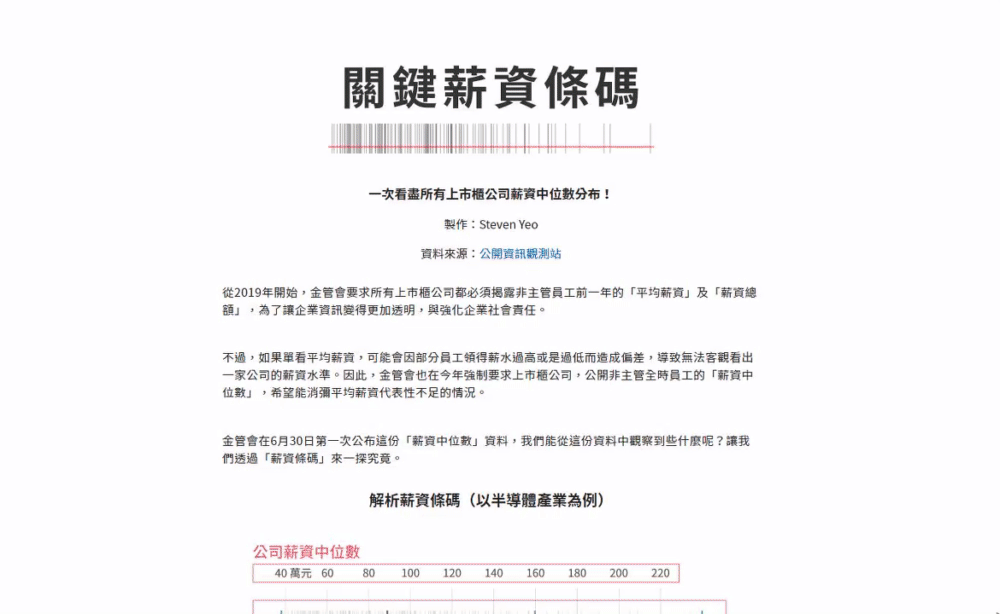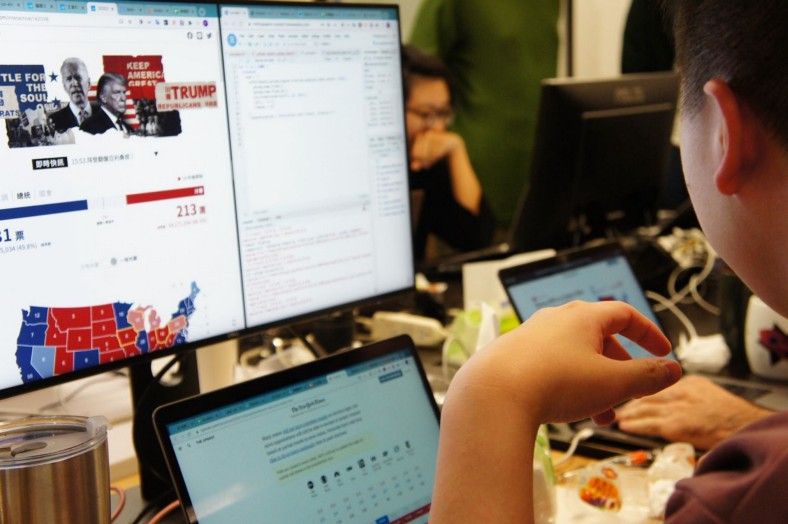[Interview] I don't like writing, Steven tells stories with code
*Note: This article was written on Nov 15, 2020
Character close-up / Zeng Zixuan
Although I have been busy recording for days because of the topic of the US presidential election, at ten o'clock in the morning on Sunday, the sound from the screen is not tired. When it comes to data visualization, there is uncontrollable excitement in his tone. Even the night before the interview, he enthusiastically shared the latest information and topics in the industry. He is the Steven of the Key Review Network. Although his current title is a data reporter, he usually not only writes news, but is also responsible for web engineering. He calls himself a "journalist engineer".
Steven has just been shortlisted for Journalism's annual event, Excellence in Journalism, for "Critical Salary Barcodes," and that's only his second entry in the industry. In this article focusing on "Visualization of Salary of Listed Cabinet Companies", he uses Scrollytelling (Scroll + Storytelling, a way of telling stories by dragging a mouse) as a narrative method, and uses a bar code chart that is not a traditional visual method to present salary, and then Combined with drop-down menus, readers can freely search for information.
And all of this is done by him independently ─ Steven is also involved in data processing and analysis, visual design, writing, and web page presentation, so multi-tasking and cross-domain, how to develop? It is necessary to start from the study stage.

When I was studying in the Department of Finance and Economics in college, I considered going to the financial industry in the past, but then I gave up the idea. Steven said that he has a competitive personality, and no matter what field he is in, he hopes to be at the top, but he feels that his mathematical ability is not enough, and he is not so good at socializing, so he decides to continue to explore. He asked himself, what other way is there to go? At that time, I knew that the school had a learning organization for the programming language R, and because I had encountered it in middle school, I didn't have much fear of programming, so I decided to start from data analysis and become what he called a "data worker".
It is also in the course of taking courses and internships that I discovered my interest in data visualization. Steven took over a research project from a teacher at the school and met with the team every two weeks to discuss it. Originally, I used to use tabular return analysis results, but because I felt that the report was very inefficient, I switched to a heat map to describe the investment portfolio, and displayed the ROI in color to distinguish between good and bad, which was unexpectedly praised. It was just one more simple step, but it got good results. Steven said that he deeply felt the advantages of data visualization, and has since studied more deeply, "because you know what it can bring us."
But this road is very lonely. "Look on the job search website, there is no one in Taiwan that specializes in this."
Generally speaking, data visualization will be included in the work content of the data analyst, but he wants to concentrate on visualization, so he has to explore outside. "I found out that there are still some, like The Straits Times, which made all Marvel characters into a cosmic relationship map. I asked, what is this profession?"
After a lot of searching, I got the answer. The job title Steven was looking for was "Visualization Engineer" or "Data Reporter". So I looked back at Taiwan. Although there were not many, he was not alone on the road.
Steven found Lin Jiaxian, a data reporter working for Commonwealth Magazine at the time. The process of getting acquainted was very simple. He sent a message to the other person's Facebook fan page and immediately received a friendly response. Can't help but ask him, are you such a direct person? Steven said, "Because I really don't understand, I don't want to walk in the dark." Later, he followed in the footsteps of his predecessors and became a data reporter for the key comment network. He said that the motivation for choosing this job was that he could concentrate on visualization. "But the media salary really isn't that high?" And considering his financial background, it's hard not to ask, but Steven responds tactfully. "At the beginning of my career, the threshold for satisfaction with money is very low, and I also want to pursue something other than money." So he entered the media industry.
At the Critical Review Network, Steven's main job is to write data journalism, and he is also responsible for large-scale feature engineering. Ask him what he thinks of his work, "I especially like the front-end and visualization, the writing is fine, but I'm a little irritable." The confident voice was a little less cheerful. Having not received journalism training, Steven said that the negative impact was obvious, most directly reflected in the relatively poor efficiency and quality of writing, and he had to ask colleagues to review all the text.
But Steven believes that there are advantages to having no journalism training, "I will not be bound by newsworthiness." When asked about his definition of newsworthiness, Steven said that he has not been in the media long enough, and he has never done news before, so he feels unqualified. discuss. Public welfare, supervising the government, and speaking for the minority, he can understand the traditional role played by the media, but he believes that he values different aspects. Even if he encounters less newsworthy subjects, he will still try to start from experience and presentation.
In order to figure out the reader's mind for a long time, his idea is close to the customer-oriented business. The professional gatekeeper role often heard in traditional news seems to have disappeared. But he claimed that he had no news value in his heart, and only emphasized that he started from the "reader's point of view".
Therefore, when choosing a topic, Steven's focus is different from that of orthodox journalism. The first is whether the event or the material itself is interesting enough; the second is whether the presentation will make the reader pay for it. If the topic itself is not attractive enough, it is necessary to use data visualization techniques to give readers a good experience. Steven cares about the flow of works, and he is also worried about how much money he can help the company make, but the deep motivation of "pleasing readers" is not only business, but more from his love for data visualization. He is convinced of the power of visualization. Just the news as a carrier.
Knowing that you've walked an off-the-beaten-path trail is by no means mainstream. But Steven believes that data presentation is not just icing on the cake, it is a source of value in itself.
The information and news in his eyes are also the product of thinking in the same context. Steven believes that the value of data journalism lies in reinterpreting the data. The first level is to allow readers to understand issues more comfortably, and the second level is to see if they can find different viewpoints by accessing the data.
When talking about the difference between accessing data and seeking help from professionals, Steven did not shy away from the potential bias of the data itself, "Be sensitive to know (bias will affect) the results, taking sexual assault as an example, you may write a lot about a certain area. Or very little. .

Since there is no news value in the heart, traffic is the priority anyway, and the reader experience is the ultimate goal, so why not just make a fishy theme? Faced with such a provocation, Steven thought for a long time and gave a negative answer. Not doing novelty themes is of course related to company policy, but mainly because of personal preference. Steven says he still has a line in his mind. “I don’t have traditional newsworthiness, so I can’t put it in words, but in a way, it feels like a bit of an intersection with traditional newsworthiness.” Maybe not exactly a fork in the road, but sometimes close and sometimes far away.
With the recent US presidential election, Steven is not only responsible for presenting the voting results on the web page, but also processing the back-end connection data. As the media industry faces digital transformation, there are more and more requirements for journalists to work multiple jobs. "Is it easy for journalism students to be replaced by people like you who have no relevant training but have other specialties?" Without thinking about it, he simply said no. In terms of traffic, data reporters are not as good as text reporters who can publish frequently. In terms of environment, because of differences in values, Taiwanese media have not been able to fully accept people like him. "If you are abroad, then you will." He used Playful tone, complement this sentence back to the carbine.
Steven said that in recent years, there have been more and more digital feature works by Taiwanese media, many of which are based on data as the starting point, and then dig deeper into the topic, which is the product of the combination of data and traditional news values. "From the reader's point of view, Taiwanese readers are just not yet developed. The narrative style is relatively special. The readers will find it interesting and highly accepted. The influence will be pulled back inside, and the person in charge will be willing to spend resources." And friends in the industry Chatting also allowed him to better clarify the differences. The works he imagined would focus more on the innovation of the material itself and the way of narration.
To complete the topic entirely on his own is Steven's current goal. Such an idea is incompatible with the professional division of labor in the media editing room, but he still wants to do it. It's not that I hate collaborating with others, but that I yearn for the sense of achievement of producing works from scratch. "I can prove to others that I can be on my own." In order to pursue such recognition, not only interviews, writing, design, but also illustrations are on the learning list. Steven takes Pudding , the US news website he admires most, as an example, because the reporters there have almost all the above skills, "They have a way, and it seems that we have no chance."
Steven, who refuses to admit defeat, will continue to walk rough, or can he turn the trail into a flower path? Time will give us the answer.

Like my work? Don't forget to support and clap, let me know that you are with me on the road of creation. Keep this enthusiasm together!





- Author
- More